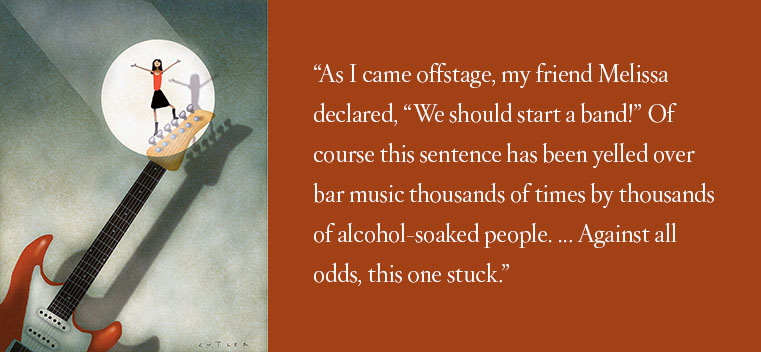
Rock On
Jennifer Keishin Armstrong (J96) is a freelance writer in New York City, co-author of Sexy Feminism (Mariner Books, 2013) and author of Mary and Lou and Rhoda and Ted (Simon & Schuster, 2013), a history of The Mary Tyler Moore Show.
Tell us what you think. E-mail comments or questions to the editors at letters@northwestern.edu.
Ever wonder about those strange designations we use throughout Northwestern to identify alumni of the various schools of the University? See the complete list.
Find Us on Social Media
It’s never too late to dig — and make — rock ’n’ roll music.
I started a rock band on my 35th birthday. Still euphoric and sweaty from a two-song karaoke set with a live band at a Brooklyn bar, I was sipping the glass of watery white wine someone had thrust at me as I came offstage when my friend Melissa declared, “We should start a band!” Of course this sentence has been yelled over bar music thousands of times by thousands of alcohol-soaked people — along with, “We should write a movie/design a fashion line/open a bar.” For most, the idea burns off with the next morning’s hangover.
Against all odds, this one stuck.
I say “against all odds” not just because most tipsy plans to start bands and bars don’t work out but for many other reasons as well. For starters, Melissa had learned to play drums on a child-size drum set, and that was still the only drum set she had; it was also the only one that would fit in her tiny Brooklyn studio apartment. And though she happened to be a professional opera singer, she did not want to sing in this band. I would do that. I had no real vocal training, just a few years of show choir in high school and a robust karaoke practice. We had no guitarist, no other instrumentalist of any kind.
We pondered placing a Craigslist ad seeking a “guitarist with no ambition.” From that we got our name, No Ambition. We did also manage to get a guitarist, Kate, whose skill set matched ours — i.e., she didn’t know much either. But we all learned together. We almost-adequately trudged through covers of many middling ’90s songs like “Don’t Look Back in Anger” and “Closing Time.” I even took up the bass guitar, something I’d never dreamed of doing. After several months we lost Kate to the demands of a new job, and I switched my bass lessons to guitar lessons. At 36 I was now the lead singer and guitarist in a rock band.
At this point, however, something magical happened: Melissa and I began to settle in together, to act like a band. I will never forget our very first gig, back when Kate was with us and the band idea was just a few months old: We lavished time on our outfits, makeup and hair, and our friends dutifully came out to cheer for us.
But that had felt like just “playing” rock star.
As Melissa and I started practicing together every week, and I tore through my guitar lessons with glee, we became musicians. (Well, she already was one in another genre, but I became one too.) I found myself not just desperately picking at chords and singing words but anticipating what Melissa might do and getting a thrill from those moments when everything came together, seemingly without effort. There’s no better feeling than that of, “We just played a real song.” Actually, there is: “We just played a real song in front of people.”
Part of what makes the latter feeling so special for us is that we don’t always get there. We’ve missed entire guitar riffs during gigs. I whiffed on lyrics to Everclear’s “Santa Monica” three times, then cut our losses and apologized to the crowd. My guitar slid off my shoulder once while I tried to play Lit’s “My Own Worst Enemy” at an open mic full of skilled singer-songwriters. Melissa laughed so hard that she couldn’t play her flute solo. (Don’t ask.)
But I realized at our most recent gig that the real pleasure of watching us is simply different from that of watching a professional band. You go to see others to marvel at talent and skill. You come to see us to find out how much we’ve progressed since our last show and to experience the exquisite suspense of whether we’ll make it through “Come to My Window” this time. It’s like a reality show but more fun.
I’ve also learned what I now consider the best performance skill to have, even though I never knew about it before I was in a struggling band: the ability to screw up onstage but continue on. I’ll never again start a song over three times because I forgot the words; you either keep going or, if the mistake is big enough, acknowledge it, shrug, maybe make a joke and move past it. The best compliment I received after our last show was “You’re really great at recovery.”
And in the end, I’ve learned that’s what being a rock star is all about — not the lights, the shiny pants or the cheering crowds. Just the confidence to be who you are in front of anyone — in front of everyone.



 Facebook
Facebook Twitter
Twitter Email
Email


